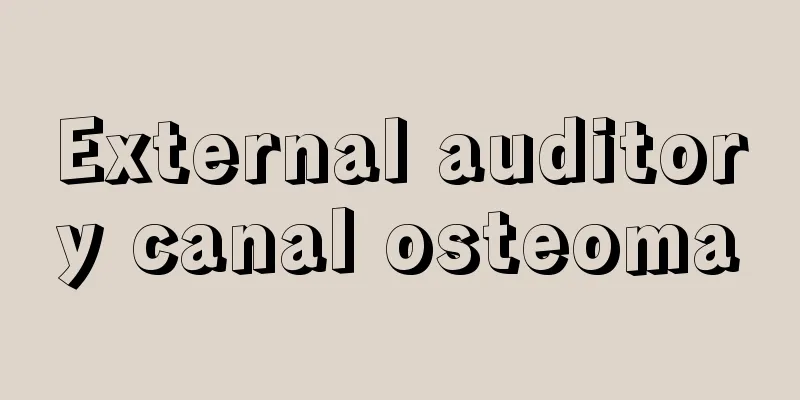External auditory canal osteoma

|
Osteoma is a very serious disease. It can occur in any part of the body. The ear is a relatively fragile place and is prone to bone tumors. Osteomas on the ear are divided into external auditory canal osteomas and internal auditory canal osteomas. However, external auditory canal osteomas are more serious. They are caused by local nodules in the ear bones. If you suffer from external auditory canal osteomas, your hearing will be greatly affected. You will often feel a buzzing sound in your ears and cannot hear clearly. The following is a detailed introduction to external auditory canal osteoma. Osteomas of the ear may occur in the external auditory canal, tympanic cavity, mastoid process, or squamous part of the temporal bone. External auditory canal exosteoma is a nodular protrusion formed by localized excessive proliferation of bone in the bony wall of the external auditory canal. It is a benign tumor and includes multiple dense bone tumors (exosteomas) and single cancellous osteoma, the latter of which is extremely rare. External auditory canal exosteoma is one of the most common benign tumors in the external auditory canal and is more common in young and middle-aged men. It is often bilateral and often multiple. Small osteomas may not cause any symptoms and are often discovered accidentally during an ear examination. When the volume increases, the external auditory canal may become narrower, causing hearing loss, or due to the combination of cerumen lumps, cholesteatoma formation, etc., the external auditory canal may be blocked, causing a feeling of occlusion or even infection, resulting in pain, pus discharge, etc. The diagnosis is not difficult based on the medical history and local findings. If a nodular or semicircular protrusion is found deep in the external auditory canal that is hard to the touch, exosteoma should be considered first. CT examination can determine the location and size of the bone tumor, as well as whether the tympanic cavity and mastoid are affected. Otoscopic examination revealed a round, smooth, hard nodule in the bony part of the external auditory canal with a broad base and covered by normal epithelium. X-rays of the skull base or temporal bone CT scans show bony external auditory canal stenosis, with a semicircular shadow that is completely consistent with or similar to the bone density. Small, asymptomatic bone tumors do not require treatment. If the tumor enlargement causes hearing loss, pain, or infection of the outer ear or middle ear, surgical resection and reconstruction of the external auditory canal can be performed. The surgery can be done through an incision in the ear, separating and lifting the skin and periosteum on the surface of the osteoma, carefully grinding them off with a high-frequency electric drill or chiseling them off with a bone chisel. If necessary, part of the external auditory canal bone wall can be ground off to reduce recurrence and avoid stenosis of the external auditory canal. |
<<: Grape seed taking method and dosage
>>: Is it serious to have a bone tumor on the head
Recommend
How to take better care of liver cancer patients? What are the symptoms of liver cancer in women?
Experts say: The early symptoms of liver cancer a...
What is the cause of nasopharyngeal carcinoma related to
What are the causes of nasopharyngeal cancer? Nas...
How to correctly prevent skin cancer
No one should let their skin come into contact wi...
What are oysters?
Oysters are a common seafood in our lives. Oyster...
What should we do if we have autonomic dysfunction?
People sometimes experience inexplicable symptoms...
Can sea crabs be frozen and preserved?
Many people in our lives like to eat crabs, espec...
What are the causes of brain tumors?
As the times progress, people's living standa...
Cervical cancer types
Cervical cancer is a common gynecological maligna...
How to prolong the life of patients with small cell lung cancer
Small cell lung cancer is harming more and more p...
What causes excessive sweating in the upper body?
There is actually not a single reason for sweatin...
What are the effects and functions of Gastrodia elata needle?
Today's society is much more advanced than be...
These 5 factors are responsible for sticky and black stools
Sticky and black stools are a common occurrence i...
What causes a sticky mouth?
The mouth often feels sticky, dry, astringent and...
The brain is dull and the reaction is slow
Slow brain reaction is a very common phenomenon i...
What are the symptoms of gallbladder cancer spreading
Knowing the common sense of gallbladder cancer wi...









